Sydney-based songwriter, singer, saxophonist, and multi-instrumentalist Kirsty Tickle is one half of art-noise duo Party Dozen, along with percussionist and multi-instrumentalist Jonathan Boulet. With Tickle’s processed saxophones and Boulet’s samples and drums played at ear-splitting levels, the duo creates squalls of sound—part planned, part improvised—that have attracted a surprising (to the band itself) number of fans in Australia.
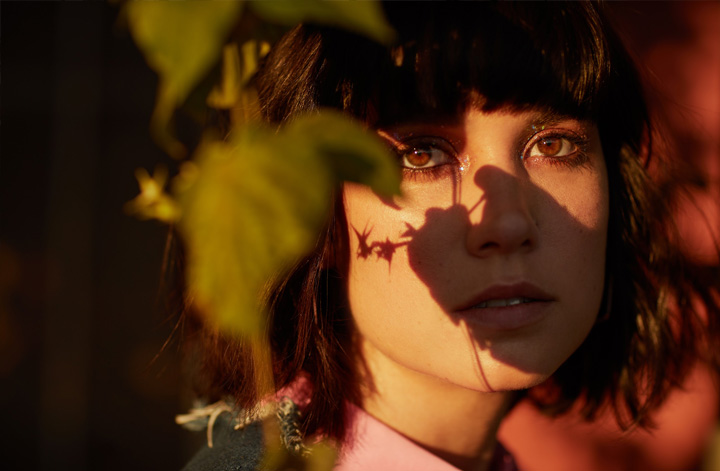
As Exhibitionist, Tickle has taken a completely different approach to making music, crafting impeccable electronic pop around her beautiful, ethereal voice. Although she commands the project, Tickle has enlisted Boulet to produce, mix, co-write, and play drums. She also assembled a full live band to help bring her songs to the stage without having to rely on any backing tracks at all.
Below, Reverb’s Nick Smethurst talked with Tickle about her approaches to both projects, how she manages to collaborate while retaining control, and what gear she uses to create both her loud freakouts and lush electronica. Later, Boulet joins the conversation as well. The rapport developed between the two artists is immediately recognizable, as they discuss how they follow their different muses, keep themselves engaged, and interact with a community of like-minded musicians.
If you had to describe the two projects in an elevator pitch scenario right now, how would you summarise each one? Do you feel that they're exercising different parts of your creative identity or are they different means to the same end?
Kirsty Tickle: I think they’re exercising different parts, definitely. They're very, very—yes, very, very different projects. Exhibitionist is a song-based project, it’s sultry, and I guess there's an element of empowered sexiness to the music that I do with it, whereas Party Dozen is more aggressive.
It's still groove-based, and it still has elements that aren’t aggressive, but I think that the sound that we have aimed for with Party Dozen is something that is more directly [intended] to make you feel very uncomfortable.
You’ve spent a lot of time playing on other people's projects, whereas now you've got two projects that very much have you at the fore. Did that happen by accident, or was it something that you were working on building up the confidence or capacity for over time?
KT: I've had a really big year of personal change—but I think that even before this year happened, Party Dozen was probably the start of this new creative evolution for me. When I was younger, I was always really interested in doing a solo project, but I never quite had the confidence to do it.
Once I started doing the Party Dozen thing, that definitely made me more confident, but I was also really aware that like, I'm not writing any songs anymore. So I just sat down one day and started Exhibitionist.
Given that both projects are anchored around your creative contribution, but you've had a long history playing as a side person in other people's bands, how has that affected your approach to collaboration?
KT: I am actually not a great collaborator, unless I know people. The people I'm working with, I need to have a relationship with them before I feel confident working with them, because I'm not—I was talking to someone about this recently. I'm not the kind of person who will walk into someone’s session or recording and be really enthusiastic—be, you know, "Alright guys, let's write a hit," or anything like that.
Instead, I'm much more... I'm there to work, you know? I've been doing this for ten years now. So, I'm much more considered in my approach, and it takes me a long time to consider whether a sound is good enough. I'll often go back and change it.
I think that that's the only reason that Exhibitionist has worked, because it's very subtle and it's very sparse, and the only reason it works is because I've been very careful about what sounds make it to the final recording.
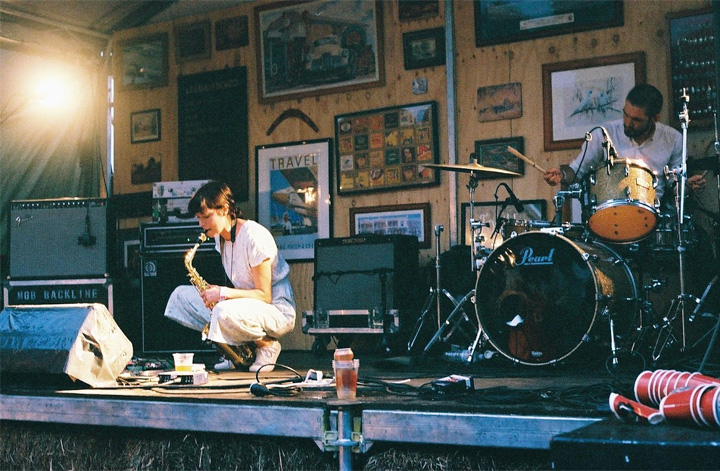
So how do you stop your own cerebral nature impeding creativity? Thinking about things as hard as you obviously do, do you think that sits at odds with being prolific or—
KT: I don’t think so. I think you can have both. I think there's a nice balance to be found. Some people make incredible music just on the fly, you know, just feeling it. I think that's actually the world that Party Dozen lives in.
Right, so it's more improv-based?
KT: Very improv-based. So we spend some time making the loops that we use, and then we'll record three improvisations over that loop and whichever one we like the best, that's the sound.Exhibitionist is more of the restrained, "Okay, how are we going to structure this song," "How are these sounds going to work together"—and all of that stuff.
Considering your formal training in the conservatory, how do you view equipment? Does it service the role of good songs or good audio-craft or is it something more? I mean, with Party Dozen it kind of seems like you're playing off the gear at times.
KT: Yes, I think we definitely are playing off the gear, you know, particularly with the sound that we make for the saxophone. We play the song, we definitely play off the gear, and we play off each other. So, I think that it's really important that we have a couple of interesting pedals in there. We're talking right now about going in to write the second album, but we need to change my setup so that the sound changes.
With Exhibitionist, I feel like, again, because it's such a sparse thing, the gear really matters—but what we use live compared to recorded is quite different. We use a bunch of CS-80 samples on the recordings. And then to emulate that we use a [Dave Smith Instruments] Prophet '08 with a Strymon Timeline.
So that kind of changes it, and then often we'll go about making the drum sounds—and I say we, because Jono also does all the drums for Exhibitionist as well.
So it's very ground-up?
KT: Very ground-up, and trying to use different sounds so it doesn’t sound the same as everything else in the genre, because it is a genre that is largely populated by other young women, and that's great, but you have to do something different to stand away from that, I think, and we've been very careful with the way that we've chosen the gear so that the sounds are very different to what you would normally hear. And the song structures are a bit more wonky.
What do you see your intrinsic motivations are for each project?
KT: So, Party Dozen, I'm honestly surprised anyone gives a shit about. Like, honestly, we never wrote anything for it to be a "thing," you know. It was just for us, because we wanted to make this music and to have anybody like it—that would’ve been a success for us. Like, if we played the DIY scene forever, we'd be happy for Party Dozen.
Maybe it's because of the fact that we have been in other bands and we've had some success in the indie world that we've had a couple opportunities thrown at us that have been surprising. We chose to play at Big Sound, which was great, and from that, you know, we've actually got some really cool shows coming up in 2018.
But Exhibitionist was—I really wanted something of my own. And even though there is some co-writing and stuff, I really just wanted something that was me all over, and a way for me to kind of work through all the emotional stuff that was happening in my own life. At the same time though, I feel like it's very... Everything that I do for that is very calculated in a way that I want it to be an art project. I don’t want it to be just a band, you know. All of the clips are related to each other and—yes, so having that kind of continuity across the project is really important to me.
Who are you working with on the visuals, and what's the goal?
KT: So, I work with a director named Josiah Eastwood and a DOP [director of photography], Jack Saltmiras. He used to play in The Middle East. And then we've got my friend, Brianna Kell, she's the choreographer, my friend Julia, who makes costumes. That's the core group—and then a bunch of friends who help out on the day, of course.
How long have you been making music with Jono?
KT: I've been making music with Jono for about eight years now.
In terms of that collaboration, what do see the genesis of a good creative relationship being?
KT: Yes, so we've got a really great relationship with each other—it's a really close friendship, which is amazing. With Party Dozen, we're both playing the instruments that we're most confident with, and that's incredible because it just means that we can improvise and, because we've known each other so long, I think that we probably do have quite a nice rapport with each other creatively as well.
And with Exhibitionist, when I was going about doing this whole thing, I needed a producer. I don’t have mixing skills. Or producing skills. So for me, it was just the most natural thing to ask Jono to do it. Then after we did "Hands," it just made sense to ask him to do some co-writing on some of the stuff, and he was really on-board with that. So we started co-writing together on everything after "Hands." Like I mentioned before, I can't have a really great creative relationship with someone I don’t know very well.
I don’t know how bands do it when they don’t like each other, when they only see each other on tour. That blows my mind. I'm just, like, this is your family. These are the people who know you inside and out. They see your most vulnerable self. Basically you, shitty in the morning, taking a 6 a.m. flight—they absolutely just see the worst of you, and then the best of you on stage and in your life as well.
To change direction completely, let’s talk about the gear itself. What's the current Party Dozen setup for you?
KT: Party Dozen for me is—I run two octaves down, with two POG pedals. Normally one on, except for maybe one or two tracks. And then the other one is like a boost for extra low-end. I run an EQ pedal at the start of my pedalboard, which is the saviour for the saxophone, because otherwise it sounds really tinny.
What is the saxophone that you're playing?
KT: I'm playing a Yanagisawa saxophone—they’re a Japanese saxophone brand that are just incredible instrument makers. I love my Yana. I was playing a Yamaha for a long time and then I upgraded to this and it's, yes, far superior.
I've got a P. Mauriat tenor saxophone, and we started out first on that, and then we moved back to the alto when we realised that, with the squealing and with doing things more in extreme ranges, it was just easier to go lower than it was to actually go higher.
And we run now, my favourite amp setup is a Marshall JCM 800, so we use that. And wherever possible, we run that through an Ampeg 8x10. That's all we normally use. We were using an Orange head for a while, a Thunderverb, but the Marshall is the way to go.
And what else is there on the board?
KT: So, we've got a Hall Of Fame reverb, a T-Rex distortion, and then we've got just another EQ that acts as a boost. And then a Line 6 DL4, and a Strymon Timeline as well that I use for different things.
I sometimes yell into the saxophone and I use the Timeline settings for that—it works better than the DL4. And sometimes I'll double delay if I'm feeling particularly adventurous. And we've got just a little shitty tremolo pedal that I—I don’t even know if it has a brand. It's great, it's some good fun, and I think that's it.
And Jono’s running the samples.
KT: Yes, he’s running just a Roland sample pad and he's just got a kit setup.
He does a lot of the samples that we make, like, he'll do it on guitar or something like that—and then mix it and make it interesting—and he processes samples live during the songs as well. I think that's really important because it’s not just backing tracks. There's no click or anything. We keep it pretty loose, which is great.
And what’s the Exhibitionist setup? I read you saying that "Hands" would never have existed without the Teenage Engineering OP-1?
KT: Yes, but I don’t use it on stage.
Okay, so live, what's the rig?
KT: So, we've got an SPD-SX set for the drums. That also has a kick trigger that runs into it, and that goes sub out as well. And then Jono also uses a snare and hats and cymbals, so it's a pretty James Blake-y drum setup. Then Adam, one of our keyboard players, plays through a bass synth, which is a Korg Minilogue, and he plays a Roland SP-555 sample pad and has a couple of pedals with a guitar that he also drops an octave down with a POG for the bass parts.
Gabby runs the Prophet ‘08 through a Timeline and through a reverb pedal as well. And then I just have vocals and my saxophone running just dry.
So the idea is that you’re creating all the music in the studio by yourself or with Jono, but then are be able to perform it live?
KT: Yes, and to not have any backing tracks or anything. That was really important to me. I think in this genre of music, you know, for better or worse, a lot of people have one singer and one guy behind her doing the stuff on a laptop—and that's fine, but it's just not how I work. I grew up playing instruments.
Even though Exhibitionist is a singing project and what I do on stage is singing, I would say that's probably what I view as my least strong musical strength. I really do see myself as an instrumentalist and not as a singer, and I think that that's probably different to a lot of people within the genre. I feel like I'm an instrumentalist who has vocal capacity.
Jono.
Jono Boulet: Yes, what's up?
Talk to me about the path that's led you to the creative projects you're currently working on.
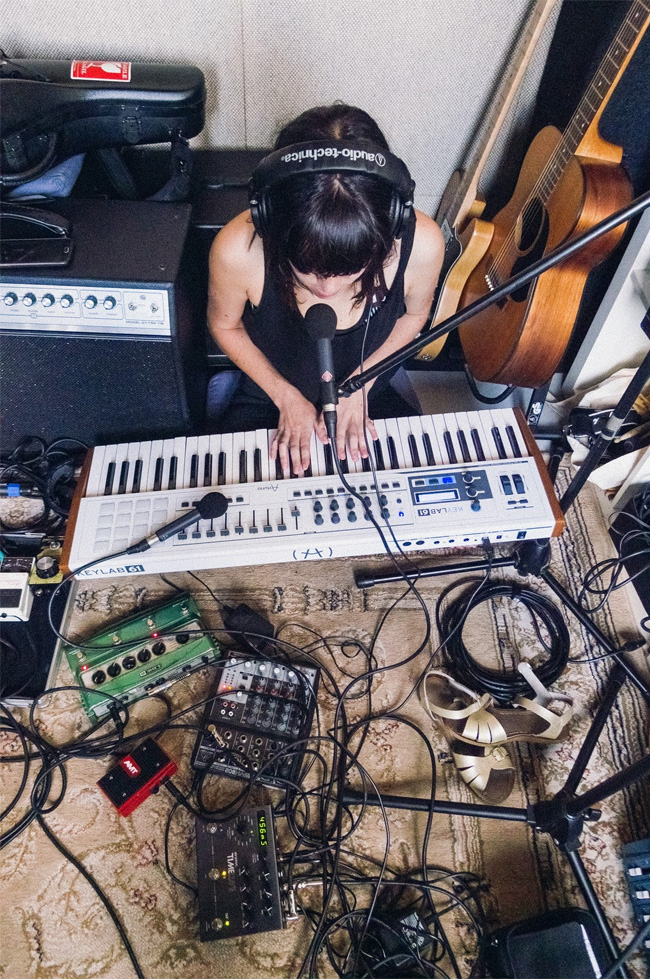
JB: I guess my journey started with home recording, figuring out how to do that out of necessity and curiosity. Recording my own little things just to learn how to do it and figuring out how to put one track on top of another, which was a revelation. Like, I borrowed a friend's two track. I remember way way back, he had one of these tiny little Zoom recorders where you could get one to two tracks on it. I just remember recording one line and then recording on top of it was something else. I was, like, Fuck, this is amazing. I was, I was over the moon about how I could record a couple of things.
Just figuring out how to plug the shit into the back of those computers where they never were supposed to take inputs, but you'd figure out how to get the adapter into that. So I guess I started there and then it just kept going from there. The band would need a recording, so we'd figure out how to do it. That lead to more experimentation with production and, like—what's possible, how many things can you make?
Both of the projects you work on together now, as well as your previous bands, are really emblematic of a DIY spirit, but that might not be what people associate with DIY. I mean, you really are doing it all yourselves. What does DIY mean to each of you? And what do you think you get out of that, that you might not get out of working in a more traditional studio environment?
KT: For the recording process, obviously with Exhibitionist we've got quite a team around it, but so far, all of the recording decisions have been made by me or Jono in the studio and without any other input and that's, like, you can hold onto that and say, "That's mine, that's my thing." And with Party Dozen, I would say that's pretty much full DIY.
JB: Yes, you retain control and therefore you can dictate how and where it's going and how "original" we want it to be. Because you want every project of yours to be creative and somewhat original, so if you're overseeing the whole thing, then you're the last word on it. You're the quality control, and I think we're quite strict with that quality control. I think it's more genuine too. It feels more personal to me.
To pick up on an earlier question: In terms of obtaining unique sounds from gear, how do you go about curating the equipment you choose to work with? What inspires you to find it, but also, how important do you think equipment is to the creative process?
KT: I think that if you don’t have good ideas, it doesn’t matter what gear you have. You're not going to really get anywhere. Confession: I could not use any guitar pedals before we started Party Dozen. It was brand new for me, so, like, with figuring out sounds and stuff, it was all just a comedy of errors. And I'm still not great with it—I'm getting better—but it takes a lot of concentration from me to know how everything's going to fit together.
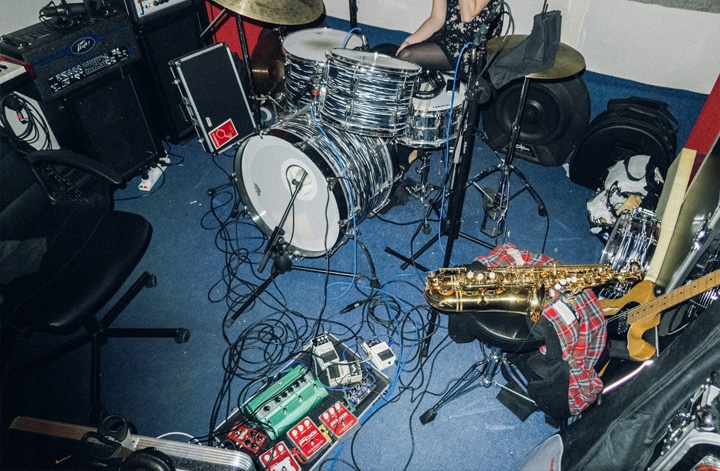
JB: I would agree that the ideas are more important, but sometimes you can't come up with an idea unless you have a nudge in the right direction. Sometimes a piece of gear can do that. Especially if it's something you haven't heard before. It triggers a new idea because you hear a sound that you haven't heard before.
KT: Yes, that's very true. In terms of me and my sax, my actual saxophone, it's very important what I use, just to get the most out of the instrument. Like, I'm not using the student model or anything, I'm using a professional instrument, and that's been really good. I think Exhibitionist, what we use is really important because it's so strict and it's sort of an exercise in what not to include.
Who do you guys think are some contemporaries of yours in the Australian landscape, either past or present? Things that, for either project, or maybe even both, you’d view as operating along similar lines?
JB: I feel like bands like My Disco are bands that have always just done whatever they want to do. They've disregarded trends, they've disregarded any kind of normal path, like, the industry direction that people say, "No, you've got to have, you've got to go this way, you've got to go that way." They've just done what they do.
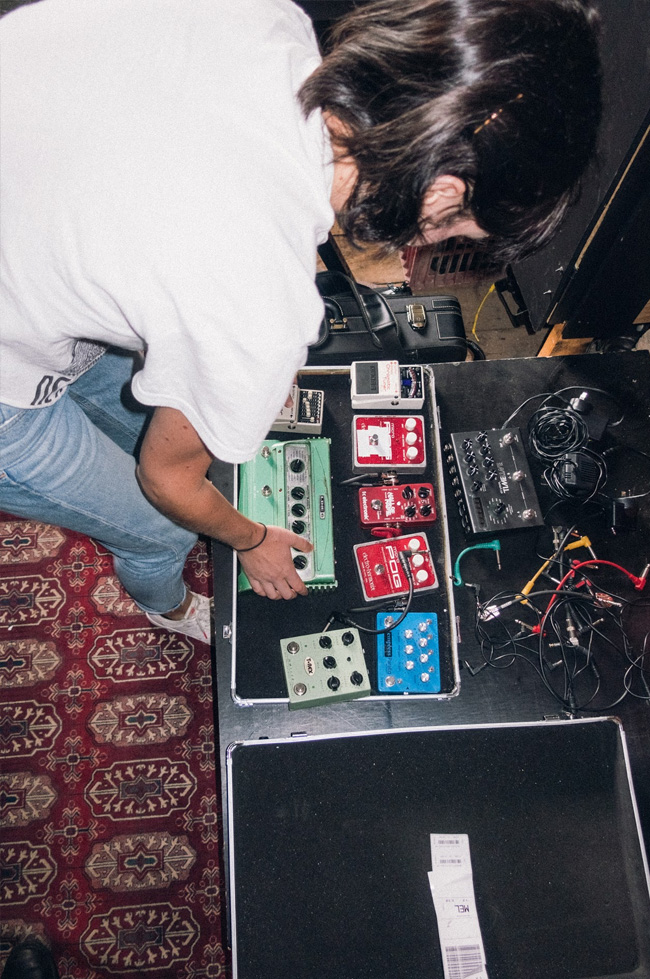
KT: Yes.
JB: And that, yes, that just shows that you can. It's, like, you don’t have to do this whole thing that's proposed to you from the industry side of things. So, bands like that. I'd also say The Dirty Three, for me, because they're just passionate about what they do and they've just always been doing it.
KT: Rowland S. Howard and that kind of ilk as well—always so genuine. They wrote music because they had a community, they wrote music and they loved writing music. Like, I think that's—
JB: It seems like a lot of those, the people in that scene, and they've always got that passion, and it's based in expression.
KT: Yes, and then, for me, like, I think also people who write genuinely about their life or their emotions are really inspiring for Exhibitionist. I think that that really comes across, you know. There's a lot of really shit lyrics on the radio and just, it's so, it's so disingenuous and people, people are writing lyrics with session writers and it's just, like, well, that's not, you know, I know I'm fucking not saying I'm a great lyricist, by any means, but—
But it's honest.
KT: But it's honest, yes. You can look at it and you can think, "I believe that you're being genuine," and that's important. So, yes, for me, even bands like The Go-Betweens as well.
I've started to realise since Exhibitionist that there is actually this really incredible group of electronic artists in Australia who are doing some really interesting, different shit that I wasn’t aware of before, so people like Christopher Port and that new Tom Iansek band, No Mono, KLLO, Braille Face, Anatole... just a lot of really cool up-and-coming electronic artists.
And it feels like there's been this, like, resurgence, but all of them are, I think, striving for the same thing that Jono and I also strive for, which is making a project that is different. It's not geared towards just getting radio play, and it feels like it's becoming this little community, for me, personally.
I reach out to a lot of people on social media, and we have chats, and, obviously, being involved with Future Classic, there are a few artists that I'm starting to get to know and who are on the label as well, and that feels really good. It feels like what it felt like when I lived in Brisbane, you know, like, it feels like there's a community, and we're going to help each other out and that's really cool, because I haven't felt that for a long time.
